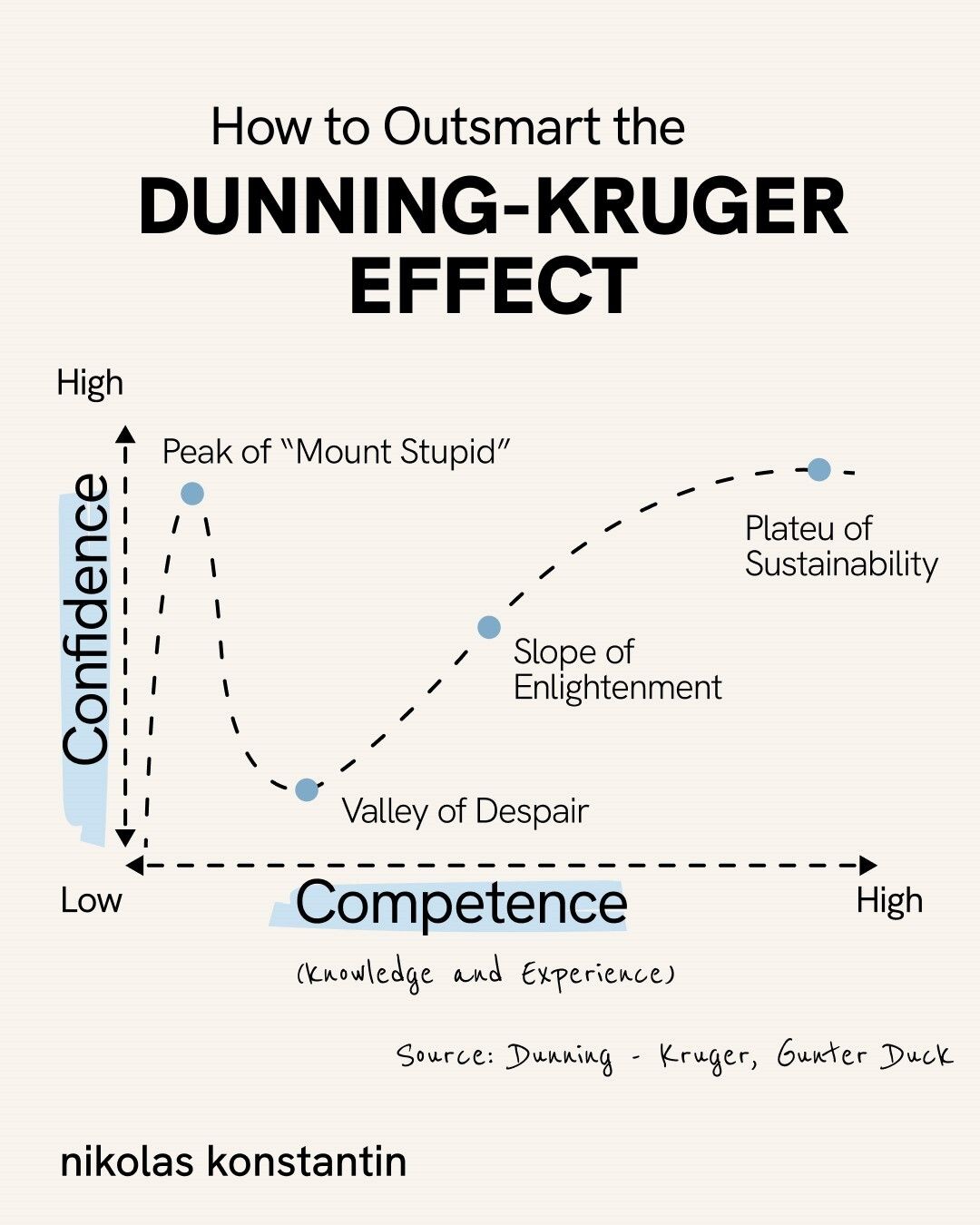
Hello Mindful Executives,
The best leaders I know are obsessed with learning.
They are constantly refining their mental models.
But unlike what most people assume, true learning isn't about vanity metrics like being "the smartest person in the room."
Instead, it’s about developing the ability to recognize and avoid stupidity.
Let us take a look at the Dunning-Kruger Effect through the lens of one of the most famous model thinkers and investors, Charlie Munger.
What is the Dunning-Kruger Effect?
It’s the cognitive bias we all fall into:
Those with the least competence overestimate their abilities.
Experts—who truly understand complexity—often doubt themselves.
Dunning Kruger in one sentence:
Ignorance feels like confidence, while wisdom feels like doubt.

The Three Pitfalls of the Dunning-Kruger Effect
Overconfidence Without Competence
“If a man’s arrogant, you just have to sit back and let him self-destruct.”
The paradox of learning is that the less you know, the more confident you feel. Novices don’t know what mastery looks like, so they assume they’ve already reached it. This is why beginners often speak with the most certainty, while experts hesitate.The Expert’s Curse: Doubting What You Know
“The trouble with making easy things seem difficult is that smart people will always second-guess themselves.”
When you truly understand a subject, you see its depth, nuance, and uncertainty. You recognize how much more there is to know. Ironically, this self-awareness can lead to imposter syndrome, where skilled individuals underestimate their own abilities.The Incompetent Can't See Their Own Blind Spots
“If you’re not confused, you’re not thinking hard enough.”
The problem with low competence is that it blocks self-awareness. Incompetent individuals don’t just lack the skills—they lack the ability to recognize their own incompetence. This is why feedback, mentorship, and critical thinking are crucial.
How to Outsmart the Dunning-Kruger Effect
Knowing that you will fall for this trap you can actively work around it. I borrowed some wisdom from Charles Munger, one of my favorite model thinkers.
There are three ways to outsmart your tendency to over and underestimate your knowledge:
Adopt Munger’s Principle of Inversion
Instead of asking, “How can I be smart?” ask, “How can I avoid stupidity?”Study past failures—yours and others’.
Assume you’re missing something and actively look for it.
Seek counterarguments to your beliefs.
Use a Feedback Loop
“You’d be amazed at how much Warren [Buffett] and I learn just by sitting on our asses and reading.”Test what you think you know.
Surround yourself with people who challenge you.
Get into rooms where you are the least knowledgeable person.
Think in Probabilities, Not Absolutes
“I never allow myself to have an opinion on anything that I don’t know the other side’s argument better than they do.”If you’re 100% sure about something, you’re probably missing something.
Be comfortable saying, “I don’t know”—it’s a sign of intelligence.

Let us recap, it is hard to estimate how much you know:
Those with the least competence overestimate their abilities.
Experts—who truly understand complexity—often doubt themselves.
Use these 3 learnings to don't fall into traps:
Avoid Overconfidence Without Competence – The less you know, the more confident you might feel. Always question your own certainty.
Use Feedback Loops – Surround yourself with people who challenge your thinking and expose you to different perspectives.
Think in Probabilities, Not Absolutes – Be comfortable with uncertainty and never assume you have all the answers.
The next time you feel too confident, remember this:
It’s not certainty that makes you wise—it’s the ability to question what you think you know.
Homework:
Where in your leadership journey have you mistaken confidence for competence, or underestimated your expertise due to humility?
The difference between wisdom and foolishness often comes down to the courage to question yourself first.
Yours,

P.S. Leading is hard.
Here is how I can support you to lead yourself and your organization:
A la Carte Executive Training:
Each year, I support selected leaders & their organizations in transforming into more resonant versions of themselves. Want to be coached by me? Apply hello.
The Yearly Reflection Space for Leaders:
A Beautiful Mind for Executives:
My virtual “A Beautiful Mind Meditation Course” for Executives. Train here.
The CEO Playbook Library:
My CEO Playbooks library features the best management and leadership theory. Exclusive access here.

Three Pillars of Wise Leadership
PPS: And because you deserve it - here is your bonus.
My 10 “Most Popular Mini Leadership Guides”:

Thanks for reading.
Did you enjoy this mail?
Is there a topic you want to read?
Would you like to see anything changed?
Just reply to this mail. I will get back to you.
Enjoy the newsletter?
Please forward this to a pal. It only takes 18 seconds. Making this one took 12 hours.
See you next Monday,



